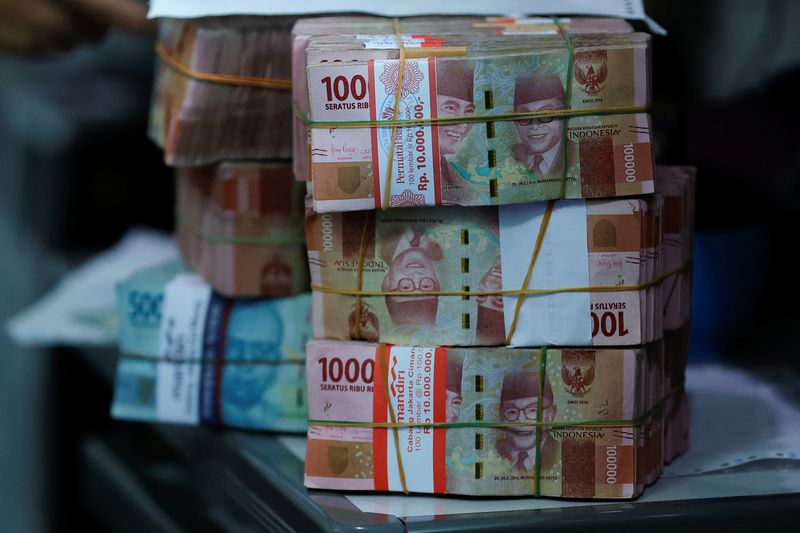By Rae Wee and Summer Zhen
SINGAPORE (Reuters) - Indonesia's currency is tumbling and foreign money in its bond markets is heading for the exits, stoking fears that Southeast Asia's largest economy is finally starting to crack after months of remarkable resilience against global headwinds.
Despite its history of merciless market drubbings during times of global economic stress, Indonesia was a surprising outperformer until August, buoyed in large part by its exports of gas, palm oil, and other prized commodities.
Its stock market is Asia's best performer this year and the rupiah fell just 3% in the six months to end-August against a forceful U.S. dollar, while South Korea's won and the Thai baht both dropped more than 10%.
But September brought a turn for the worse as the rupiah slid 2.5%, its largest monthly fall this year and more in line with its Asian peers, leading analysts and investors to raise alarm bells over old, familiar risks: dwindling currency reserves, rising debt obligations and foreign capital flight.
"It's a catch-up, or catch-down, kind of effect," said Galvin Chia, an emerging markets strategist at NatWest Markets. He blamed the currency's stumble on volatile external factors including the dollar's relentless climb.
But this time around, market experts say, will be different, as Indonesia's relatively solid economy and monetary policy will help it to resist the sort of battering it endured in crises past.
"You still have reasonable carry, you still have a central bank, now at least, more proactive, and has a lot of credibility, and you still have the tailwinds from the commodities," said Ihab Salib, senior portfolio manager and head of international fixed income group at Federated Hermes (NYSE:FHI).
"I think all of those together, to me, point to Indonesia maybe outperforming on a relative basis."
The rupiah's historic vulnerability owed to its status as a risky but high-yielding "carry" trade, attracting high foreign ownership of Indonesian bonds when yields in more developed markets offered relatively paltry returns.
During the Federal Reserve's previous tightening cycle in 2018, the rupiah fell to multi-decade lows. During the 2013 "taper tantrum", it plunged 20%.
RUPIAH DOWNTURN
But rising commodity prices have been a backstop this year, with a widening current account surplus providing a cushion against capital outflows. Foreign ownership of Indonesian bonds, which used to be as much as half the market a decade ago, is also lower, around 14%.
Yet Indonesia's yield advantage has been evaporating as rates elsewhere rise faster. Outflows from the bond market, where yields are as high as 7%, reached $11 billion in the first three quarters of 2022, nearly double the $5.7 billion for all of 2021.
"I suspect it's more of a delayed reaction," said Vishnu Varathan, head of economics and strategy at Mizuho Bank, regarding the rupiah's recent downturn.
"There are some exceptional factors, but none of these would provide that kind of panacea for underlying risks that remain."
With no signs that the surging dollar will peak anytime soon, Varathan highlights risks that Indonesia's external debt obligations and falling currency reserves could become a worry at the same time domestic policy tightening hits growth.
"If these things start to conspire ... we could get a pretty abrupt episode of capital outflows."
Indonesia's foreign exchange reserves fell by $1.4 billion last month to $130.8 billion, due to debt payments and Bank Indonesia's efforts to stabilise the rupiah.
Data for September also showed a surge in Indonesia's inflation to a seven-year high, reflecting a jump in fuel prices.
The stock market nonetheless remains a bright spot, as investors bet that prices of the oil and other resources that Indonesia exports will stay high. Jakarta's benchmark index, up more than 3% year-to-date at Friday's close, is among only a handful with gains this year, along with Brazil's Bovespa Index which is up nearly 7%.
Bank Indonesia, which until recently was one of the world's last dovish central banks and drew concerns about complacency over inflation, also reassured markets last month with a surprisingly aggressive rate hike of 50 basis points, which it cast as a pre-emptive measure to rein in inflation expectations.

"Indonesia remains a very good story in the Asian portfolios," said Rajat Agarwal, an Asia equity strategist at Societe Generale (OTC:SCGLY) SA.
"If you look at consumption, look at credit growth, everything is domestic, unlike the other export markets in Asia. Indonesia would be one of the more resilient markets in the current backdrop."